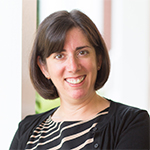Client Services Manager, Overleaf
 Please tell us a bit about yourself (e.g. hometown, current locale, course of study).
Please tell us a bit about yourself (e.g. hometown, current locale, course of study).
I’m a Virginia native, and currently live in Crozet, VA, at the foot of the Blue Ridge Mountains. I got my BA in Sociology from Wellesley College. I loved living in the Boston area, but couldn’t take the winters!
Describe some of your current responsibilities, and what type of organization you belong to.
I’m the Client Services Manager for Overleaf. Overleaf is a collaborative writing and publishing system that makes the whole process of producing academic papers much quicker for both authors and publishers. Overleaf is a free service that lets you create, edit, and share your scientific ideas easily online using LaTeX, a comprehensive and powerful tool for scientific writing. I work with universities and publishers as they come onboard, implementing portals, templates, and other integrations, and have developed processes to support that. I work closely with our sales and marketing team to make sure our clients are taken care of during all stages of the sales cycle. More recently, I’ve started working with our support team to develop processes and procedures to make things continue to run smoothly as we scale up. As is the case for most people who work at startups and small companies, I also take on occasional odd jobs like writing blog posts and leading workshops.
What was your first scholarly publishing role? How did you get that job? What path led to your current position?
As with most people in this field, I didn’t intend to end up in scholarly publishing. I was an airline pilot for several years, and pursued a master’s degree through distance education way back in early aughts when that meant getting a box of VHS tapes at the beginning of the semester. I developed great relationships with the librarians, who were the key to getting the resources I needed to complete my coursework. After 9/11, my airline was in financial trouble, and I took a leave of absence to go to graduate school full time at University of Virginia for Instructional Technology. This would give me the option of a career change if my airline went out of business. It did, and I happily went to work in an academic library. A few years later, a grad school classmate recruited me to work for ScholarOne as the instructional technologist. I spent nearly nine years there in various roles.
If there was a pivotal moment or key person in your career development, please describe briefly.
I left ScholarOne and went to work in finance. It was a great place to work, but I realized immediately that I missed scholarly publishing! It took leaving the field to make me realize two key things. One, that I had expertise in scholarly publishing that I wanted to put to use. And two, that a large part of my personal satisfaction at work came from knowing that my job was helping, in however small a way, to advance research and make the world a better place.
What tools, web sites and organizations do you find most valuable for your career development?
Meeting people in person and making personal connections is by far the most valuable tool for career and personal development. I work remotely, and carving out time for calls, video calls, and in-person meetings takes great effort, but is worth it. In an effort to have regular contact with humans outside of my house, I’m an active member and officer of my local Toastmasters club. Toastmasters has also allowed me to practice my public speaking skills, and I enjoy speaking to groups and giving workshops.
What are some of the surprises/obstacles that you’ve encountered during your career?
Gender bias, both implicit and explicit. Oddly enough, I felt the effects of that far less when I was one of a small handful of female pilots at my company (it was less than 5% women). Everyone was covered by the union’s collective bargaining agreement (CBA), and advancement was strictly determined by that CBA.
What do you wish you knew more about?
Coding and software architecture. My work is “technology adjacent,” and the more I learn about how software is built, the better I can communicate, both with the technical team and with my clients and colleagues.
What advice would you give to people interested in a career in scholarly communications?
Scholarly publishing is constantly changing — you can carve out your own niche, no matter what your background. Make genuine personal connections, and be open to possibilities that stretch you professionally.

